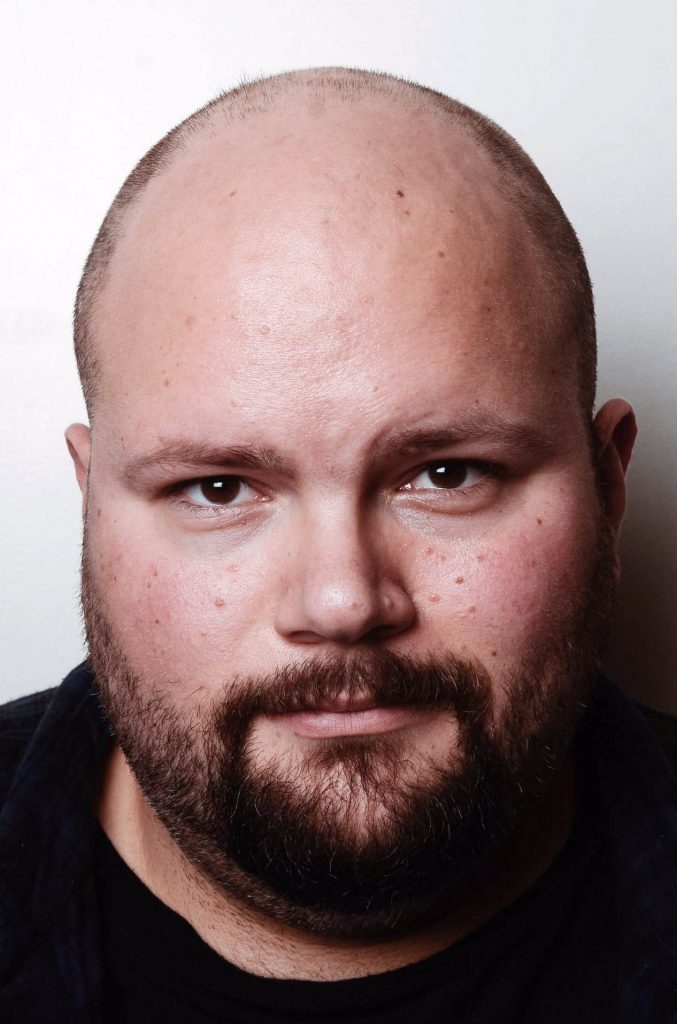 This month, I had the pleasure of interviewing Sam Wiebe, author of Vancouver crime novels Last of the Independents, Invisible Dead, and just released this year, Cut You Down.
This month, I had the pleasure of interviewing Sam Wiebe, author of Vancouver crime novels Last of the Independents, Invisible Dead, and just released this year, Cut You Down.
I’ve been following Sam for a couple of years on Twitter, and recently got the chance to see him in conversation with Seattle mystery writer Brian Thornton at Third Place Books. After enjoying Invisible Dead and meeting him in person, I knew I wanted to learn more about Sam and his writing.
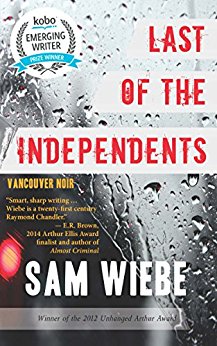 Peg: Sam, how did you decide to become an author?
Peg: Sam, how did you decide to become an author?
Sam: From a very early age I liked making stories. In my teens and early twenties I wrote, submitting short literary pieces and accumulated rejections. When I started grad school, I realized that it was “sh– or get off the pot” time. I focused on writing a novel, revising it, and submitting it. That became my first book, Last of the Independents.
P: So many writers have that “sh– or get off the pot” moment. But not many moments lead to writing a novel that wins the Arthur Ellis Award for best unpublished manuscript. Congrats, Sam! What made you decide to write crime fiction?
S: I didn’t see the through-line until much later. I always read everything: from lit fic to sci fi, westerns, you name it. But mysteries and crime were a big part of it, ever since Encyclopedia Brown and the Hardy Boys. My first attempt at a novel was supposedly mainstream, but had a violent crime and an investigation. There was a point I remember looking at my bookcase, overstuffed with predominantly crime novels, Sue Grafton, Elmore Leonard, etc., and thinking, “Hunh, I guess I like crime fiction the most.” It was an important moment of recognizing the tendencies which were already there.
P: How did you develop your writing chops?
S: I’m basically self-taught, though I took a great screenwriting class in college. I read a ton of how-to books, starting with Michael Newton’s How to Write Action Adventure Novels. Mostly, though, it was work—just writing stories, learning through trial and error. I’m probably part of the last generation that got actual physical rejection slips.
P: Hey, I’m part of that generation too. You wrote your first book while in graduate school, but you were also self taught in terms of writing. What did you think of your graduate school experience? Did it help you with your writing?
S: I studied English literature, which of course is helpful, but doesn’t have a lot to do with learning how to write novels. I clarified some parts of my writing process in grad school—writing my first draft by hand, for instance. It helps to figure out your true thoughts on something.
P: Wow. Do you still write your drafts by hand? Also, are you a pantser or plotter or both?
S: For the most part, yeah. All three of my books started out as handwritten first drafts. However, I’ve been working on a stand-alone novel, and I wrote the first draft of that on my computer. As for pantser/plotter, I’m somewhere in between, like most people. I like to have a rough idea of where I’m going, but that can take the form of a “beat sheet,” or just an idea of the ending. But anything can change as the book’s written.
P: Do you have a job? If not, what job did you leave to write full time?
S: I taught college English for five years. I write full-time, though I’m also doing more speaking events and also teaching writing. Last weekend, I ran my first seminar, a “Mystery Writing Masterclass,” and it was resoundingly successful. I hope to do more of those.
P: Congrats on the masterclass. I’m glad to hear it went well. What was it like teaching college English? How did you decide to leave?
S: I really enjoyed it, for the most part. Most of my students were science and economics majors, for whom English was a second language. It was challenging to find readings that would speak to them. I left when I was chosen as the Writer in Residence for the Vancouver Public Library (VPL) in 2016.
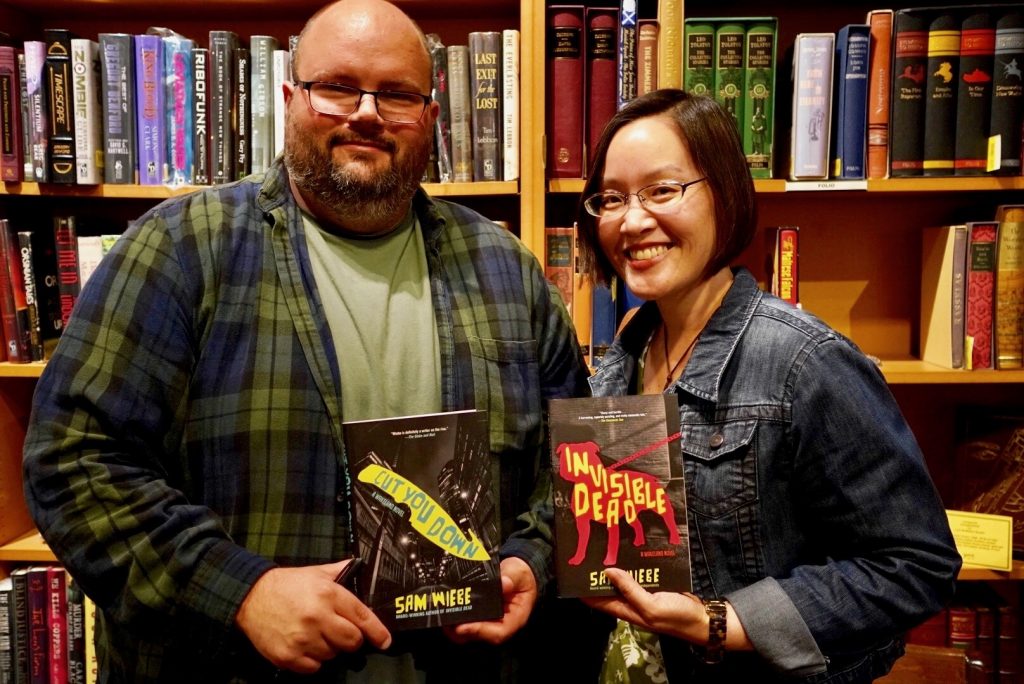 P: You said at the Third Place Books reading that being VPL’s Writer in Residence was the best job you’d ever had. What was it like?
P: You said at the Third Place Books reading that being VPL’s Writer in Residence was the best job you’d ever had. What was it like?
S: The residency was split between time spent writing and designing workshops and events that would help aspiring writers. I ran three craft-related writing courses, led an Asian Mystery Novel book club, moderated a panel of historical crime fiction authors, and did events for low-income writers and seniors. It was great.
P: Asian Mystery Novel book club? That sounds awesome. Do you earn a full-time income from your books and speaking/teaching, or do you support yourself in other ways?
S: The short answer is yes; the longer answer: a writing career is very dependent on outside forces, the choices that agents and publishers make. Income varies book to book. At the moment I’m supporting myself through writing, with the odd seminar and speaking event. But there’s no guarantee or safety net.
P: That’s great that you’re supporting yourself from your books and speaking gigs. Is there a novel out there that you wish you had written?
S: True Grit, The Long Goodbye, Wuthering Heights, Frankenstein…there’s a lot of brilliant fiction out there. I try not to allow myself to get too jealous about contemporary writers, but I have tremendous respect for Peter Temple and Sue Grafton, both of whom we lost in the last year.
P: Your first novel, Last of the Independents, is a stand-alone, but your second novel, Invisible Dead, turned out to be the first book in the Dave Wakeland mystery series. Did you know when you created Dave that he would be part of a series?
S: I knew that Invisible Dead, because of its subject matter, was 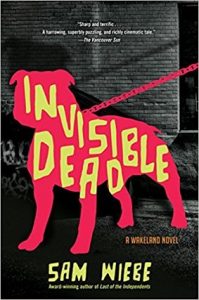 tonally different than Last of the Independents, darker, and more realistic, more based on the Vancouver and Pacific Northwest that I live in. I wanted to build on that world.
tonally different than Last of the Independents, darker, and more realistic, more based on the Vancouver and Pacific Northwest that I live in. I wanted to build on that world.
P: What inspired you to create Dave Wakeland? Is he based on someone you know?
S: He reflects some of the concerns and issues I’ve confronted in my own life. He’s a young guy, trying to find his place in a rapidly changing and occasional hostile city.
P: Something I love about Invisible Dead are all the Vancouver details such as Jefferson Chen being Dave Wakeland’s business partner instead of a white guy, his coworker Shuzhen offering him a Chinese donut, and Dave walking down real streets such as Thurlow and Pender. It’s obvious that you love your city, while at the same time, you’re aware of its growing problems. Will your future novels be set in Vancouver or other cities?
S: I’ll definitely continue to write about Vancouver as long as I can. I find it a fascinating place. At the same time, I’m working on a stand-alone novel set closer to the US-Canada border.
P: The beginning of Invisible Dead starts off with, “I don’t know why this city sees fit to kill its women. Answers won’t be forthcoming.” Did you gain any insights into this dilemma by the time you finished writing your novel?
S: Yes and no. I did a lot of research on the subject of murdered and missing women, and while I think I have a good understanding of the systemic forces at play, I can’t claim any special insights. My hope for the book was to point out and acknowledge the lack of those stories in the cultural discourse—to focus on one disappearance and use that to illustrate some of the social forces at play.
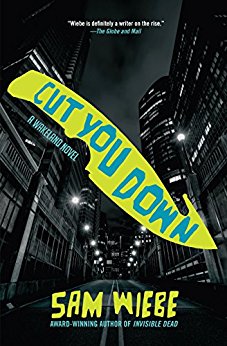 P: This was one of the main reasons I picked up Invisible Dead. Not many mysteries have a social justice component, but I appreciated that yours did. Thanks so much, Sam, for taking the time to answer my questions. It was great getting to know you, and learning more about your background and approach to writing. I’m looking forward to reading Cut You Down and your future books!
P: This was one of the main reasons I picked up Invisible Dead. Not many mysteries have a social justice component, but I appreciated that yours did. Thanks so much, Sam, for taking the time to answer my questions. It was great getting to know you, and learning more about your background and approach to writing. I’m looking forward to reading Cut You Down and your future books!
Sam Wiebe is the author of the Vancouver crime novels Cut You Down, Invisible Dead, and Last of the Independents. His short stories have appeared in Thuglit, Spinetingler, and subTerrain, and he was the 2016 Vancouver Public Library Writer in Residence. He lives in Vancouver.
Hope you enjoyed this interview. To learn more about Sam and his books, visit his site, follow him on Twitter and Facebook, and check out his books on Amazon.
Peg Cheng is the author of The Contenders, a middle-grade novel that asks, can enemies become friends? She is currently writing another novel that is a re-imagining of the Snow White fairy tale set in 1980s Seattle. Peg is also the creator of Fear & Writing, a workshop for procrastinating writers from all walks of life.